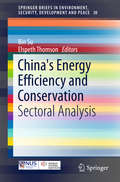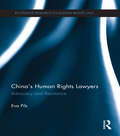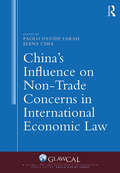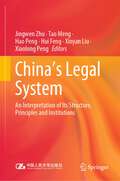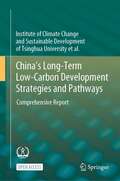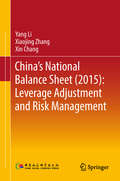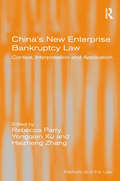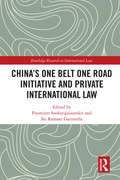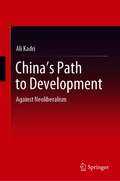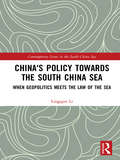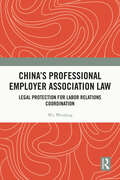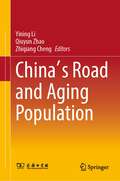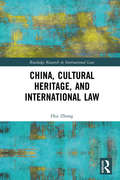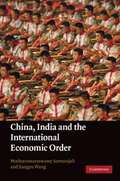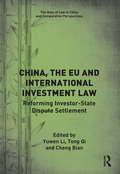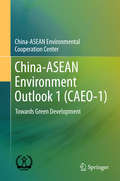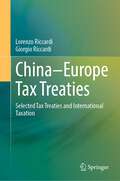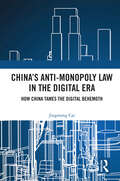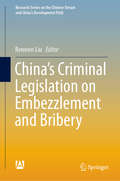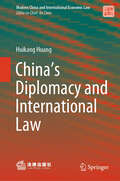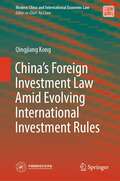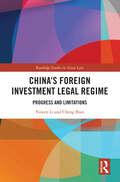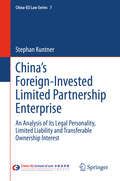- Table View
- List View
China's Energy Efficiency and Conservation: Sectoral Analysis (SpringerBriefs in Environment, Security, Development and Peace #30)
by Bin Su Elspeth ThomsonThis Brief identifies various aspects of energy challenges faced by the Chinese central/local governments, and also provides an opportunity to study how best to achieve green growth and a low-carbon transition in a developing country like China. The progress of China's carbon mitigation policies also has significant impacts on the on-going international climate change negotiations. Therefore, both policymakers and decision makers in China and other countries can benefit from studying the challenges and opportunities in China's energy development.
China's Foreign Investment Law in the New Normal: Framing the Trajectory and Dynamics
by Shen WeiThis book analyzes China's foreign investment law which came into force in January 2020. The new law implemented sweeping changes and overhauled China’s foreign investment law regime of the last four decades. The foreign investment law aims to make the business environment more investor-friendly and address some of the contentious issues between US and China in the ongoing trade war. The book explains how the law enhances regulatory transparency. It also outlines the new approval process, that is the pre-establishment negative list system which has replaced the former approval system for foreign investment projects. This book will help give readers a better understanding of major changes and benefits under the new law and will be the first of its kind looking at the implications of this law.
China's Human Rights Lawyers: Advocacy and Resistance (Routledge Research in Human Rights Law)
by Eva PilsThis book offers a unique insight into the role of human rights lawyers in Chinese law and politics. In her extensive account, Eva Pils shows how these practitioners are important as legal advocates for victims of injustice and how bureaucratic systems of control operate to subdue and marginalise them. The book also discusses how human rights lawyers and the social forces they work for and with challenge the system. In conditions where organised political opposition is prohibited, rights lawyers have begun to articulate and coordinate demands for legal and political change. Drawing on hundreds of anonymised conversations, the book analyses in detail human rights lawyers’ legal advocacy in the face of severe institutional limitations and their experiences of repression at the hands of the police and state security apparatus, along with the intellectual, political and moral resources lawyers draw upon to survive and resist. Key concerns include the interaction between the lawyers and their bureaucratic, professional and social environments and the forms and long term political impact of resistance. In addressing these issues, Pils offers a rare evaluative perspective on China’s legal and political system, and proposes new ways to assess domestic advocacy’s relationship with international human rights and rule of law promotion. This book will be of great interest and use to students and scholars of law, Chinese studies, socio-legal studies, political studies, international relations, and sociology. It is also of direct value to people working in the fields of human rights advocacy, law, politics, international relations, and journalism.
China's Influence on Non-Trade Concerns in International Economic Law (Global Law and Sustainable Development)
by Paolo Davide Farah Elena CimaThis volume examines the range of Non-Trade Concerns (NTCs) that may conflict with international economic rules and proposes ways to protect them within international law and international economic law. Globalization without local concerns can endanger relevant issues such as good governance, human rights, right to water, right to food, social, economic, cultural and environmental rights, labor rights, access to knowledge, public health, social welfare, consumer interests and animal welfare, climate change, energy, environmental protection and sustainable development, product safety, food safety and security. Focusing on China, the book shows the current trends of Chinese law and policy towards international standards. The authors argue that China can play a leading role in this context: not only has China adopted several reforms and new regulations to address NTCs; but it has started to play a very relevant role in international negotiations on NTCs such as climate change, energy, and culture, among others. While China is still considered a developing country, in particular from the NTCs’ point of view, it promises to be a key actor in international law in general and, more specifically, in international economic law in this respect. This volume assesses, taking into consideration its special context, China’s behavior internally and externally to understand its role and influence in shaping NTCs in the context of international economic law.
China's Legal System: An Interpretation of Its Structure, Principles and Institutions (Understanding China)
by Hui Feng Hao Peng Jingwen Zhu Tao Meng Xinyan Liu Xiaolong PengThis book provides a systematic and detailed introduction to the formation process and current development of China's socialist legal system. The classification of the constitution and constitution-related laws, criminal law, civil and commercial law, administrative law, economic law, litigation and non-litigation procedural law, social law, and the specifics of each sector of law are explained, which is a good guide for understanding the framework of China's legal system and the study of each sector of jurisprudence.
China's Long-Term Low-Carbon Development Strategies and Pathways: Comprehensive Report
by Institute of Climate Change and Sustainable Development of Tsinghua University et al.This open access book introduces a multi-disciplinary and comprehensive research on China's long-term low-carbon emission strategies and pathways. After comprehensively considering China’s own socioeconomic conditions, policy design, energy mix, and other macro-development trends and needs, the research team has proposed suggestions on China’s low-carbon development strategies and pathways until 2050, with required technologies and policies in order to realize the goals of building a great modern socialist country and a beautiful China. These achievements are in conjunction with the climate goals set in the Paris Agreement alongside Global Sustainable Development. The authors hope that the research findings can serve as a reference for all sectors of Chinese society in their climate research efforts, offer support for the formulation and implementation of china’s national low-carbon development strategies and policies, and help the world to better understand China’s story in the general trend of global green and low-carbon development.
China's National Balance Sheet: Leverage Adjustment and Risk Management
by Xiaojing Zhang Xin Chang Yang LiThe book aims at perfecting the national governance system and improving national governance ability. It evaluates the balance sheets of the state and residents, non-financial corporations, financial institutions and the central bank, the central government, local government and external sectors – the goal being to provide a systematic analysis of the characteristics and trajectory of China’s economic expansion and structural adjustment, as well as objective assessments of short and long-term economic operations, debt risks and financial risks with regard to the institutional and structural characteristics of economic development in market-oriented reform. It puts forward a preliminary analysis of China’s national and sectoral balance sheets on the basis of scientific estimates of various kinds of data, analyzes from a new perspective the major issues that are currently troubling China – development sustainability, government transformation, local government debt, welfare reform, and the financial opening-up and stability – and explores corresponding policies, measures, and institutional arrangements.
China's New Enterprise Bankruptcy Law: Context, Interpretation and Application (Markets and the Law)
by Yongqian Xu Haizheng ZhangChina has recently entered a significant stage in its economic transition with the introduction of a new and seemingly sophisticated bankruptcy law drawing inspiration from mature insolvency systems. However, this new law is likely to face significant challenges within its implementation due to weaknesses in the countries legal and social infrastructure. China's New Enterprise Bankruptcy Law clearly presents the structure of China’s reformed legal bankruptcy system by introducing the framework and analyzing typical cases which have been or are being heard since the new bankruptcy law was operational. Written by Chinese experts with a professional interest and specialist knowledge of insolvency law, this volume serves as an indispensable guide for academics and researchers in the area, as well as practitioners and professionals involved with Chinese business law.
China's One Belt One Road Initiative and Private International Law (Routledge Research in International Law)
by Sai Ramani Garimella Poomintr SooksripaisarnkitThe concept of the One Belt One Road initiative (OBOR) was raised by the President of the People’s Republic of China in October 2013. The OBOR comprises the ‘Silk Road Economic Belt’ and the ‘21st Century Maritime Silk Road’, encompassing over 60 countries from Asia to Europe via Southeast Asia, South Asia, Central Asia, West Asia, and the Middle East. The overall objective of the OBOR is to encourage the economic prosperity of the countries along the Belt and Road and regional economic cooperation, encourage mutual learning between different civilizations, and promoting peace and development. However, countries along the Belt and Road routes of the OBOR project have diverse laws and legal systems. It is not difficult to envisage problems relating to harmonisation of laws and rules in trade between countries along the OBOR routes or otherwise. These problems can potentially cut through the core of the very objective of the OBOR itself. Integration in China’s One Belt One Road Initiative explores possible challenges to the success of the OBOR arising from the situational interface of diversity of laws, with the focus primarily on issues associated with private international law. It shows the latest state of knowledge on the topic and will be of interest to researchers, academics, policymakers, and students interested in private international law issues pertaining to the OBOR routes as well as private international law in general, Asian studies, and the politics of international trade.
China's Path to Development: Against Neoliberalism (Springerbriefs In Political Science Ser.)
by Ali KadriThis book is a treatise against neoliberalism illuminated by the path of China. China is a model to be mimicked, but more so theoretically than by replication. If anything, nations of the global South must rid themselves of neoliberally imposed ‘one-size-fits all’ models, instrumentalised to shift value to US empire. Neoliberal models, robbing nations of their histories and resources, are negative ‘best practice’ serving the interests of the hegemon. Developing nations need to search for the theory that corresponds to their own conditions and development strategies. China’s experience, anchored in labour as the historical agent, offers numerous theoretical cues as to how to build comparable home-grown paths. Thinking development with a subject voids reductionist politics in favour of sober class analysis. The study concludes by restating the age-old wisdom that there is no development without the rule of labour.
China's Policy towards the South China Sea: When Geopolitics Meets the Law of the Sea (Contemporary Issues in the South China Sea)
by Lingqun LiThis book provides an explanation of Chinese policy towards the South China Sea, and argues that this has been sculpted by the changing dynamics of the law of the sea in conjunction with regional geopolitical flux. The past few decades have witnessed a bifurcated trend in China’s management of territorial disputes. Over the years, while China gradually calmed and settled most land-border disputes with its neighbors, disputes on the ocean frontier continued to simmer in a seething cauldron. China's Policy towards the South China Sea attributes the distinctive path of China’s approach to maritime disputes to a unique factor – the law of the sea (LOS) as the "rules of the road" in the ocean. By deconstructing the concept of "sovereignty" and treating the LOS as an evolving regime, the book examines how the changing dynamics of the LOS regime have complicated and reshaped the nature and content of sovereign disputes in the ocean regime as well as the options of settlement. Applying the findings to the South China Sea case, the author traces the learning curve on which China has embarked to comprehend the complexity of the dispute accordingly and finds that it is the dynamic interaction of the law of the sea regime and the geopolitical conditions that has driven the evolution of China’s South China Sea policy. This book will be of great interest to students of Chinese and Asian politics, international law, international relations and security studies.
China's Professional Employer Association Law: Legal Protection for Labor Relations Coordination
by Wu WenfangThis book studies the coordination mechanism of labor relations from the perspective of China’s law on employer association.The first part of the book examines the definition, functions, and institutional basis of employer associations in different types of labor relations, focusing on the complementarity between the law and the coordination mechanism of labor relations in the context of different social environments, institutional frameworks, and their different responses to deregulated labor policies. It then reviews the legislation, responsibilities, and institutional guarantees of employer associations in modern China. The second part outlines the current limitations of legal resources in terms of subject matter, participation mechanisms, and participation channels that constrain the coordination of industrial relations by China’s employer associations. The author emphasizes that the systematic legal safeguards of employer associations should be function-oriented and gradually established in a targeted and differentiated manner.The title will appeal to labor and employment law scholars and legislators, and especially to those interested in the law of employer association.
China's Road and Aging Population
by Yining Li Zhiqiang Cheng Qiuyun ZhaoIn the context of global population aging , the aging population of China is not only a China-specific problem but also a global concern. Based on in-depth analysis, this book focuses on the increasingly serious issue of aging population of China at the present time, and explores the possible path and solution from the new type of demographic dividend that is innovation. With 1/5 of the global aging population in the world, China has the largest aging population and is aging faster and deeper, which produces and , profound and far-reaching impact on the economic growth, social security, health care and other related areas.
China, Cultural Heritage, and International Law (Routledge Research in International Law)
by Hui ZhongChina is a country that is rich in antiquities, but it is also a victim of looting that occurred during the period from the First Opium War to the end of the Japanese Occupation (1840–1945) when innumerable cultural objects were lost overseas. The Chinese Government insists on asserting its interest over its wrongfully removed cultural heritage and has sought for the return of lost cultural heritage by all means in accordance with relevant international conventions and Chinese laws. However, securing the return has been, and continues to be, problematic. Little research has been done regarding the question as to whether China has a legal basis for recovery, which is the first legal hurdle that China needs to get over. In addition, China does not have a legal basis for all cultural heritage taken during the period of 1840–1945. Claims for return without a legal basis are usually silenced or, at best, discussed only but very rarely facilitated. This book provides an answer for the return of Chinese cultural heritage. It examines the law contemporaneous to the removal of Chinese cultural heritage and its application. For this lack of a legal basis, this book argues that a new customary international law is emerging, according to which the interests of the states of origin in their wrongfully removed heritage should be prioritised. This proposed customary rule supports the return of wrongfully removed heritage. Once this proposed customary rule is accepted, it will provide a stronger argument not only for China, but also for other states of origin with a similar dilemma, including South Korea, Egypt, Greece, Cambodia, Turkey, Peru, and Italy, to recover their wrongfully removed heritage. While dealing with a large pool of return cases, this book is valuable to museums and art collectors in the event of buying and accepting art objects, and settling recovery disputes with states of origin. It will also be of interest to researchers, academics, policymakers, and students in the fields of cultural heritage law, international law, international trade, and human rights law.
China, India and the International Economic Order
by Muthucumaraswamy Sornarajah Jiangyu WangWith contributions by a variety of internationally distinguished scholars on international law, world trade, business law and development, this unique examination of the roles of China and India in the new world economy adopts the perspectives of international economic law and comparative law. The two countries are compared with respect to issues concerning trade and development, the World Trade Organization, international dispute settlement, regional/free trade agreements, outsourcing, international investment, foreign investment, corporate governance, competition law and policy, and law and development in general. The findings demonstrate that, though their domestic approaches to economic issues diverge, China and India adopt similar stances at the international level on many major issues, recapturing images which existed during the immediate post-colonial era. Cooperation between China and India could provide leadership in the struggle for economic development in developing countries.
China, the EU and International Investment Law: Reforming Investor-State Dispute Settlement (The Rule of Law in China and Comparative Perspectives)
by Yuwen Li Tong Qi Cheng BianThis book provides an original and critical analysis of the most contentious subjects being negotiated in the China–EU Comprehensive Agreement on Investment (CAI). It focuses on the pathway of reforming investor-state dispute settlement (ISDS) from both Chinese and European perspectives in the context of the China–EU CAI and beyond. The book is divided into three parts. Part I examines key and controversial issues of the China–EU CAI negotiations, including market access, sustainable development and human rights, as well as comparing distinct features between the China–EU CAI and the China–US BIT. Part II concentrates on the institutional reform of investor-state arbitration with an extensive analysis of the EU’s approach to replacing the private nature of investment arbitration with the public nature of an investment court. Part III addresses the core substantive and procedural issues concerning ISDS, such as the role of domestic courts in investment dispute settlement, the status of state-owned enterprises (SOEs) as investors, transparency and the protection of victims in investment dispute resolution. This book will be of interest to scholars and practitioners in the field of international investment and trade law, particularly investment dispute settlement.
China-ASEAN Environment Outlook 1 (CAEO-1)
by China-ASEAN Environmental CooperationThis book presents a comprehensive analysis of the status and progress of China-ASEAN green development and examines the common development issues in China and ASEAN Member States (AMSs). It also explores development trends within the framework of global and regional environmental governance and discusses the approaches towards green development in China and AMSs, offering its own definition of green development and using a “pressure-state-response” (PSR) model to build a framework for assessing green development. The book includes typical policy measures and numerous practices for green development in China and AMSs in the form of tables, figures and boxes. Based on detailed analysis, it argues that the global 2030 Agenda for Sustainable Development brings significant opportunities to China and AMSs, that the ongoing pragmatic cooperation should be further advanced, and that a connection between the Belt and Road Initiative and green ASEAN Community should be established to achieve regional sustainable development. As such it furthers readers’ understanding of environment and development and practical policy advice for promoting China-ASEAN cooperation on environment and green development. Intended for decision makers from the government, business sector, and civil societies who are working to boost green development and China-ASEAN cooperation, it is also a valuable resource for government officials, researchers and non-experts interested in creating a balanced relationship between the environment and development.
China–Europe Tax Treaties: Selected Tax Treaties and International Taxation
by Lorenzo Riccardi Giorgio RiccardiThis book covers the Tax Treaties which The People’s Republic of China has signed with various nations of the European Region. This book is a collection of the treaties, supplementary materials, and selected implementing circulars. It is edited and ordered according to geographical/economic criteria and accompanied with integrated with tables, domestic tax systems reports, and accompanying circulars and treaty model texts. This book has never been compiled for Chinese tax treaties before, providing a new resource for firms and researchers to access the materials with ease. This book has the potential to be a part of a volume on China double tax treaties, and the book will encompass the entirety of China’s Global Tax treaties. The intended readership of this book will be primarily professionals who are working in both the international accounting and legal industries. These readers frequently reference the treaties through the course of their normal business for the purpose of forming optimum tax structures and corporate structuring. However, it is also foreseeable that this book will be of interest to academic researchers in multiple fields from geo-politics, accounting, legal to economics.
China’s Anti-monopoly Law in the Digital Era: How China Tames the Digital Behemoth
by Jingmeng CaiThe book aims to depict the whole picture of China's Anti-Monopoly Law (AML) in the digital sector and reveals the three key factors that shape AML enforcement.The author introduces the legal revolution and a major enforcement campaign in the digital sector. She focuses on three typical monopolistic behaviours—abuse of dominant position, merger control, and monopoly agreements. High-profile cases—such as administrative penalties against Alibaba and Tencent and private lawsuits against Apple and Didi Chuxing—are discussed in detail. She also identifies three underlying factors that have influenced AML enforcement reform: the political factor, the legal factor, and the academic factor. Finally, the book raises open questions and challenges that are relevant not only to China but to a wide range of jurisdictions.The book will appeal to competition law (antitrust) and Chinese law academics, practitioners, and officials, as well as general readers interested in the subject.
China’s Criminal Legislation on Embezzlement and Bribery (Research Series on the Chinese Dream and China’s Development Path)
by Renwen LiuThis book discusses in a Chinese context the criminal policy and legislation related to embezzlement and bribery, which are considered major problems of global significance in both theory and practice, and in so doing to demonstrate the progress made by the Chinese government over the last 30 years with regard to preventing these crimes. More specifically, it addresses a variety of issues, such as embezzlement and bribery legislation and its history in New China; the effects of legislation on judicial practice; criminological analysis of the causes of corruption crimes; related criminal statutes and their improvements; judicial interpretation, sentencing issues and prevention measures; the design and improvement of related criminal procedure; comparative studies on laws in relation to the punishment and prevention of corruption crimes; and international cooperation in the pursuit of corrupt officials. In a word, taking the relevant history and current reality, as well as domestic and international prevention mechanisms into account, the book discusses the legal framework, evaluates its implementation, reviews the merits and shortcomings of criminal legislation and judicial practice, and puts forward legislative and judicial proposals regarding prevention mechanisms. It offers a comprehensive but accessible (academic) reference work for legal researchers, students, lawyers and all others interested in the criminal legislation and policy with regard to corruption crimes in China.
China’s Crony Capitalism
by Minxin PeiChina's efforts to modernize yielded a kleptocracy characterized by corruption, wealth inequality, and social tensions. Rejecting conventional platitudes about the resilience of Party rule, Minxin Pei gathers unambiguous evidence that beneath China's facade of ever-expanding prosperity and power lies a Leninist state in an advanced stage of decay.
China’s Diplomacy and International Law (Modern China and International Economic Law)
by Huikang HuangThe book is a tour de force by a world renowned legal expert and senior diplomat. Its main feature is a well-balanced integration of diplomatic thinking and legal analysis, based on the 70-year diplomatic theory and practice in China. Rich in content and thought provoking, it systematically discusses the international law issues faced by China in the development of major country diplomacy with Chinese characteristics. The author creatively develops the concepts of Blue Diplomacy to refer to global ocean governance, Green Diplomacy to deal with climate change, Red Diplomacy to cope with anti-corruption, Digital Diplomacy for cyberspace governance, each with amplified amount of cases and materials. The author also deliberates the “one country, two systems” policy and the building of “community with shared future of mankind”. The book helps the readers to better understand the fundamental principles and policies of China's diplomacy. For students, it is a key that opensup the door to international law studies; for researchers, it is a rich mine of international legal issues; for diplomats, it is a valuable guidance to master the art and science of legal diplomacy.
China’s Foreign Investment Law Amid Evolving International Investment Rules (Modern China and International Economic Law)
by Qingjiang KongThis book focuses on an article-by-article interpretation of the Foreign Investment Law of the People's Republic of China, which was adopted on March 15, 2019. It also describes the legislative process of the law and the relationship between the law and other laws and regulations. It also includes a comparison of China's new foreign investment law with representative foreign investment regimes and the interaction between China and evolving international investment rules and the law, with a focus on the impact of evolving international investment rules on the development of China's foreign investment regime.In recent years, the momentum of globalization has continued to grow, and a pattern of economic governance with valorization, regionalization, and benefit sharing has gradually emerged. Amid the emergence of new international investment rules, the Foreign Investment Law of the People's Republic of China, adopted on March 15, 2019, has significantly changed the face of China's foreign investment regime. Given that China is a major destination for global foreign direct investment flows, its foreign investment regime is a focus of attention for international investors and international lawyers. This book aims to provide a practical legal guide for students of Chinese law, especially Chinese business law, practitioners, and their clients interested in the Chinese market, and observers of international investment law and national investment law practice.
China’s Foreign Investment Legal Regime: Progress and Limitations (Routledge Studies in Asian Law)
by Yuwen Li Cheng BianChina has developed a piecemeal pattern of regulating foreign investment since the end of 1970s. The latest law is the Foreign Investment Law (FIL), which became effective on 1 January 2020. The groundbreaking new FIL is well acknowledged for its promises and affirmations pledged to investors, signalling China’s eagerness to improve its investment environment and regain momentum for investment growth. This book provides an updated and holistic understanding of the key features of the regulatory regime on foreign investment in China with critical analysis of laws and their implementation. It also examines sensitive and complex legal issues relevant to foreign investment beyond the 2020 FIL and new developments on foreign-related dispute settlement. The book uses cases of success and failure to illustrate the nuances and differences between law and practice regarding foreign investment. Considering China’s magnitude in the global economy and the weighty role of the regulatory system on foreign investment in China, this book is of great interest to a wide range of audience including academics in the field of investment law, legal practitioners, policymakers, and master's students in law and in management.
China’s Foreign-Invested Limited Partnership Enterprise: An Analysis of its Legal Personality, Limited Liability and Transferable Ownership Interest (China-EU Law Series #7)
by Stephan KuntnerSince a reform in 2010, foreign investors can establish a Foreign-Invested Limited Partnership Enterprise (FILPE) in China together with Chinese or foreign investors. The FILPE can be combined with a domestic or foreign corporate general partner, thus allowing for a structure that offers the flexibility and taxation conditions of a partnership while protecting its investors against personal liability like a company. The book explores from the perspective of a foreign investor if the FILPE is an attractive investment vehicle by analysing whether it provides the characteristics that are internationally recognized as constituting a standard corporate form. Among these characteristics, the three that are most strongly interconnected and interdependent form the core of the analysis: legal personality, limited liability and transferable ownership interest. These are analyzed in context of China's restrictive framework of foreign investment regulations and enterprise organization law.
